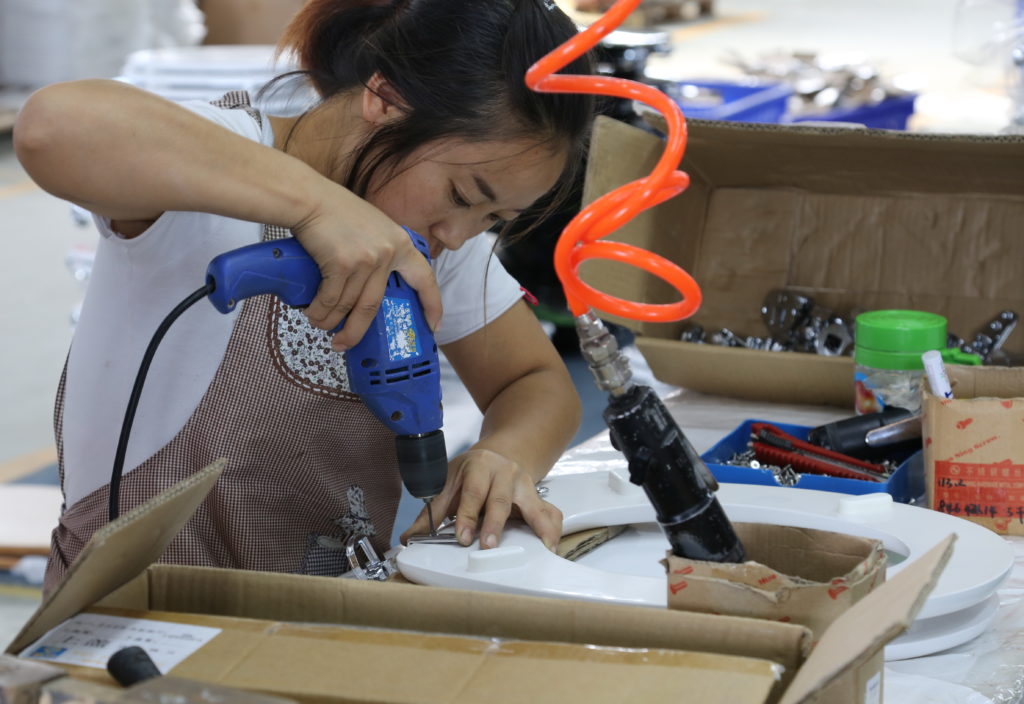
CHINA DAILY PHOTO
From the designs that glow at night to the models that can be used to potty-train kids, made-in-China electronic toilet seat covers are winning the hearts of consumers the world over, particularly in the West.
Chinese commode cover manufacturer Topseat is now selling around 2 million pieces every year globally, netting $26 million, said the company top executive.
Topseat’s clients include major home improvement retailers such as US firm Home Depot Inc and Lowe’s Cos and Germany’s OBI Group and Bauhaus.
Its high-tech toilet seats are also sold on US e-commerce platform Amazon under the Topseat trademark.
“More than 70 percent of our products are exported to Germany and we have taken up more than 60 per cent share for the do-it-yourself toilet seat market in Germany, with that for mid-to high-end ones reaching 80 per cent,” said Wu Dongcheng, president of the company.
“Our toilet seat covers are sold in more than 70 countries, including Germany, the United States, the United Kingdom, France, Italy, South Africa, Kenya and Zimbabwe.”
It has been quite a turnaround for the 42-year-old businessman, who set up the toilet seat company in 2003 only as a trial program to boost his resume for a business school application.
In 2003, the company sold the first batch 2,000 toilet seats to an Italian company at $4 each. But now the company’s toilet seats are sold at $35 to $70 each in the US market, while the price in the European market is even higher, with some products costing more than 100 euros ($117.6).
From its factory in Anshun, a city in Southwest China’s Guizhou province, Topseat creates decorative toilet seats from locally sourced, environmentally friendly materials such as bamboo, straw stalks and bio-glues.
Being eco-friendly is a key factor for the company’s success in the Western markets, as they are more environmentally concerned, Wu said.
In 2014, the company took the lead to make toilet seat covers from straw stalks to turn this potential environmental hazard into a business opportunity.
Topseat has an agreement with Xiayun township in Anshun, which buys straw stalks from local farmers on behalf of the company.
Sales of toilet seats made of straw stalk are expected to reach more than 200,000 pieces this year. Topseat is negotiating with the World Wildlife Fund to use the WWF logo on its product packaging.
“We aim to increase the sales of straw-made toilet seats to 5 million units annually in the next five years,” said Wu.
Innovation is another reason behind for Topseat’s success. It holds more than 1,000 patents for its over 5,000 pattern designs, everything from flying birds, flowers, green bamboo leaves, whales, turtles and the Eiffel Tower, and some even with relief sculptures and 3D effects.
“Most of our toilet seat covers have slow-close feature: as the lid closes, you can see the whole process of flowers blossoming,”said Wu.
One well-received cover can be used for both adult and babies, making it a good choice for families with toddlers. Topseat uses a magnet to connect the toddler seat to the lid, so it is basically hidden when it is not in use.
In addition, the child’s fingers won’t get trapped as both the lid and the adult seat have the slow-close feature.
The company developed this special toilet seat cover in 2007. In the same year, the model sold more than 400,000 pieces in the US market, giving the design a head start and the company millions of dollars in revenue.
On online shopping platform Amazon, a Topseat toilet seat is sold from $35 to $70, depending on the model/design, which generally receives high ratings and praise from satisfied customers.
“This seat is very easy to install and seems to be made from high-quality materials. I have never spent this much for a toilet seat and this is well worth the price,” wrote one customer.
“I feel a little silly to rave about a toilet seat, but the turtle on the seat is gorgeous. The fish and turtle appear to move as you do and the design changes to another scene as you look from different angles,” commented another.
Topseat also wants to tap into the Chinese market.
In 2015, reports of Chinese tourists swarming stores in Japan during the Chinese New Year holiday to buy all electronic toilet seats in stock provoked heated discussions among Chinese netizens, when it was later discovered that they were made in China.
The quality of toilet seat covers made in China is as good as, if not better, than those made by Japanese companies, said Wu, who also recognized that more marketing and advertising are needed before Chinese consumers know about and accept the Topseat brand.